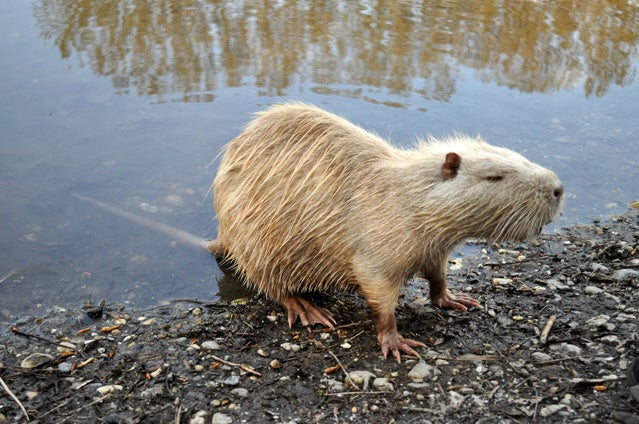The 4th of July is supposed to be a holiday. But if you’re anything like me, the last thing you’re feeling right now is relaxed. With flights to make, “fun-filled” family get-togethers to recover from and plenty of work to catch-up on, rules the day.
But things could be worse, I promise. For one, you could be a nutria—the varmint nobody but has ever heard of. According to my Spanish-speaking friend, the word nutria is simply a catch-all for any otter-like species. Apparently, she is wrong (), and it turns out that wildlife officials are doing their very best to eradicate these (cute?) pests.
While only some of us can sympathize with the vanishing varmints, languages are disappearing, and that’s something we all should be thinking about. Nearly half of all known languages are set to be lost within the next 50 years, and it remains unclear how much irreplaceable knowledge will go with them.
As some scientists rush to catalogue and decipher languages edging toward oblivion, North Carolina is taking every step to defend its disappearing coastline by its way above water-line. Unfortunately, they’ve taken the always courageous “” approach by requiring rates of sea level rise to be calculated on historical trends—not the latest science that predicts accelerated rates of increase.
And things might only get worse for North Carolina if is finally tapped. Mongolia just happens to sit on the world’s largest untouched coal deposit, and companies from China to the U.S. are clamoring for mining rights. But with Norway paying Indonesia $1 billion to protect its forests and tensions between Mongolia and its money-hungry neighbors looming, some are calling for a multi-billion dollar.
Sure, the Mongolia land-buy is quixotic, but it’s actually not completely crazy. More than four-in-five American voters find with support cutting across party lines. Many voters say they’re willing to pay more in taxes to protect the environment, and 79 percent of respondents think preservation can go hand-in-hand with economic growth. While we’re far from ready to buy Mongolia’s coal deposits, we do care a great deal about our outdoors.
So without further ado, here are the five articles to satiate your post-Independence Day intellectual, anxiety-fuelled and patriotic appetite.
It’s not just the coastal states that are threatened by globalization and economic growth, but languages. And this matters a whole lot more than you might otherwise think.
“Increasingly, as linguists recognize the magnitude of the modern language die-off and rush to catalog and decipher the most vulnerable tongues, they are confronting underlying questions about languages’ worth and utility. Does each language have boxed up within it some irreplaceable beneficial knowledge? Are there aspects of cultures that won’t survive if they are translated into a dominant language? What unexpected insights are being lost to the world with the collapse of its linguistic variety?”
It’s not just the nutria that should be worried; scientists have their eyes on mosqutoes, and the future is … complicated.
“In one tightly controlled space, mosquitoes are hatched, nurtured, fed a combination of goat’s blood and fish food, and bred. Lab technicians then destroy the females they have created and release the males into the wild. Eggs fertilized by those genetically modified males will hatch normally, but soon after, and well before the new mosquitoes can fly, the fatal genes prevail, killing them all. The goal is both simple and audacious: to overwhelm the native population of Aedes aegypti and wipe them out, along with the diseases they carry. The engineered mosquitoes, officially known as OX513A, lead a brief but privileged life.”
The local food movement is old news, but the it is far from over.
“Several dozen heads nod in assent. To this crowd, locavores aren’t mere silly liberals. They’re a menace. In fact, the people in this room, led by Desrochers, view locavores with about the same conspiratorial alarm with which some food activists view Monsanto.”
Nothing gets us more riled up and patriotic than the Olympics. But with Lance in the news, it’s hard to dissociate the games from doping. Here’s a look at the athletes looking for an illegal edge, and the scientists doing their best to stop them.
“Traditionally, anti-doping was reactionary,” Eichner says. “They would wait for a drug to be brought on the market, and then they would think, well, maybe athletes are using it, so we better prohibit it and then work out a test.” WADA has spent more than $54 million to date on anti-doping research to predict and prepare for new drugs that might enhance performance.”
Independence Day wouldn’t exist were it not for the troops. And is doing a wonderful and tear-enducing job of covering the veterns that make the fireworks possible. Here’s but one example of their terrific work.
“Rias wakes just about every morning with it, a constant reminder of what happened that October afternoon in Helmand Province, as if he needs any reminder of the moment that changed the course of his life. He still gets headaches, residual effects from the trauma inflicted on his brain. He has a foot-long scar running along his spine.”
And in case you’re dying for more, read about the , the , (and is now fighting for his life) and Britain’s constitutional crisis.


